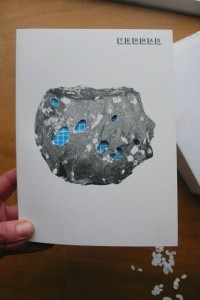With: Rita Raley, Simon Biggs, Andreas Maria Jacobs, J.R. Carpenter and Renee Turner
Doors open: 20:00
Start: 20:30
Free entrance
This program takes place in collaboration with members of the ELMCIPresearch – Electronic literature as a model of Creativity and Innovation in Practice (www.elmcip.net). It is narrowly connected to the conference ‘Digital Poetics’ that takes place at the University of Amsterdam at the 9th and 10th of December. The conference focuses on the question of digital ‘poetics’, understood in its largest sense, as the question to the nature and the value of digitally born artworks, in criticism and in practice itself.
In recent years, both criticism and practice of digitally born poetry have created a theoretical and historical basis for the approach of this new art-form. What is digital poetry? What is so new about it? Which artistic traditions does is preserve? Which terms and concepts do we need in order to fully understand and describe its practices? Questions like these have been discussed and answered. Now the time has come to look closer at its contextual, social and political embedding. Digital poetry does not operate in isolation, and its poetics, politics and practice should be seen in the context of 20th and 21st century art: it is in all respects a contemporary art form.
Perdu focuses on interventionist digital art projects. Four artists have been invited to address the question how we might account for the practice of disruption enacted in their works. They will perform and show recent work and address the aesthetic strategies they use that together form a critical intervention, dissent and resistance. A discussion with the artists (and the public) – led by Rita Raley – will bring the evening to a closure.
About the performers:
Simon Biggs is a professor, media artist, writer and curator with interests in digital poetics, auto-generative/interpretive (affective) systems, interactive and performative environments, interdisciplinary research and co-creation. His work has been widely presented, for example in Tate Modern, Pompidou Centre and Berlin Kulturforum. He has been keynote at many conferences and lectured internationally. He is lead investigator on a number of major research projects and Professor of Interdisciplinary Arts, Edinburgh College of Art at the University of Edinburgh, where he directs the Masters by Research in Interdisciplinary Creative Practices and several PhD students.
Andreas Maria Jacobs is a transdisciplinary artist. He studied Physics & Mathematics and Musicology at the University of Amsterdam, and Electronic & Computer Music at the Rijksuniversiteit Utrecht. In 1986 he started the quarterly web-artzine Nictoglobe. He developed several net-art works, such as ‘Semantic Disturbances’, an experimental work in progress (since 2005), which uses Google to explore relations between society’s changing attitudes towards art, religion and technology.
J.R. Carpenter is a Canadian artist, writer and maker of maps, zines, books, poems, fiction, non-fiction and non-linear hypermedia narratives. She studied Life Drawing and Anatomy at the Art Students’ League of New York, and Fibres and Sculpture at Concordia University in Montreal. Carpenter has been using the Internet as a medium for the creation and dissemination of experimental texts since 1993.
Renee Turner is an American artist and teacher living in the Netherlands. She describes her educational background as hybrid. Turner has produced several text-driven pieces for the web that engage in the idiosyncrasies of networked culture. Whether working individually or collaboratively (with Riek Sijbring and Femke Snelting under the name De Geuzen), her projects often employ tactical media to explore female identity, narratives of the archive and online media ecologies.
Rita Raley is Associate Professor of English at the University of California Santa Barbara, with courtesy appointments in Film and Media Studies, Comparative Literature, and Global Studies. Her primary research interests lie at the intersection of digital media and humanist inquiry, with a particular emphasis on cultural critique, artistic practices, and language (codework, machine translation, electronic literature, and electronic English). One of her major works, Tactical Media deals with new media art in relation to neoliberal globalization.
 Met Maarten van der Graaff, Martijn den Ouden, Erik Solvanger, Elma van Haren, Samuel Vriezen, Jan Willem Anker, Lieke Marsman, Hans Groenewegen, Piet Gerbrandy, Jannah Loontjens, Miek Zwamborn, Stella Bergsma, Robert Anker, Maria van Daalen, Marieke Winkler, Diana Ozon, Floris Solleveld, Roberta Petzoldt, Han van der Vegt, Narcis Zohrehnassab, Nic Castle, Guido Favié, T. Martinus, Michael Tedja, Michiel van Kempen, Adriaan Krabbendam, Kira Wuck, Thomas Möhlmann en Tsead Bruinja.
Met Maarten van der Graaff, Martijn den Ouden, Erik Solvanger, Elma van Haren, Samuel Vriezen, Jan Willem Anker, Lieke Marsman, Hans Groenewegen, Piet Gerbrandy, Jannah Loontjens, Miek Zwamborn, Stella Bergsma, Robert Anker, Maria van Daalen, Marieke Winkler, Diana Ozon, Floris Solleveld, Roberta Petzoldt, Han van der Vegt, Narcis Zohrehnassab, Nic Castle, Guido Favié, T. Martinus, Michael Tedja, Michiel van Kempen, Adriaan Krabbendam, Kira Wuck, Thomas Möhlmann en Tsead Bruinja. 







